Book of Thel (PDF)
File information
This PDF 1.4 document has been generated by , and has been sent on pdf-archive.com on 16/12/2014 at 06:14, from IP address 66.45.x.x.
The current document download page has been viewed 1499 times.
File size: 152.46 KB (8 pages).
Privacy: public file
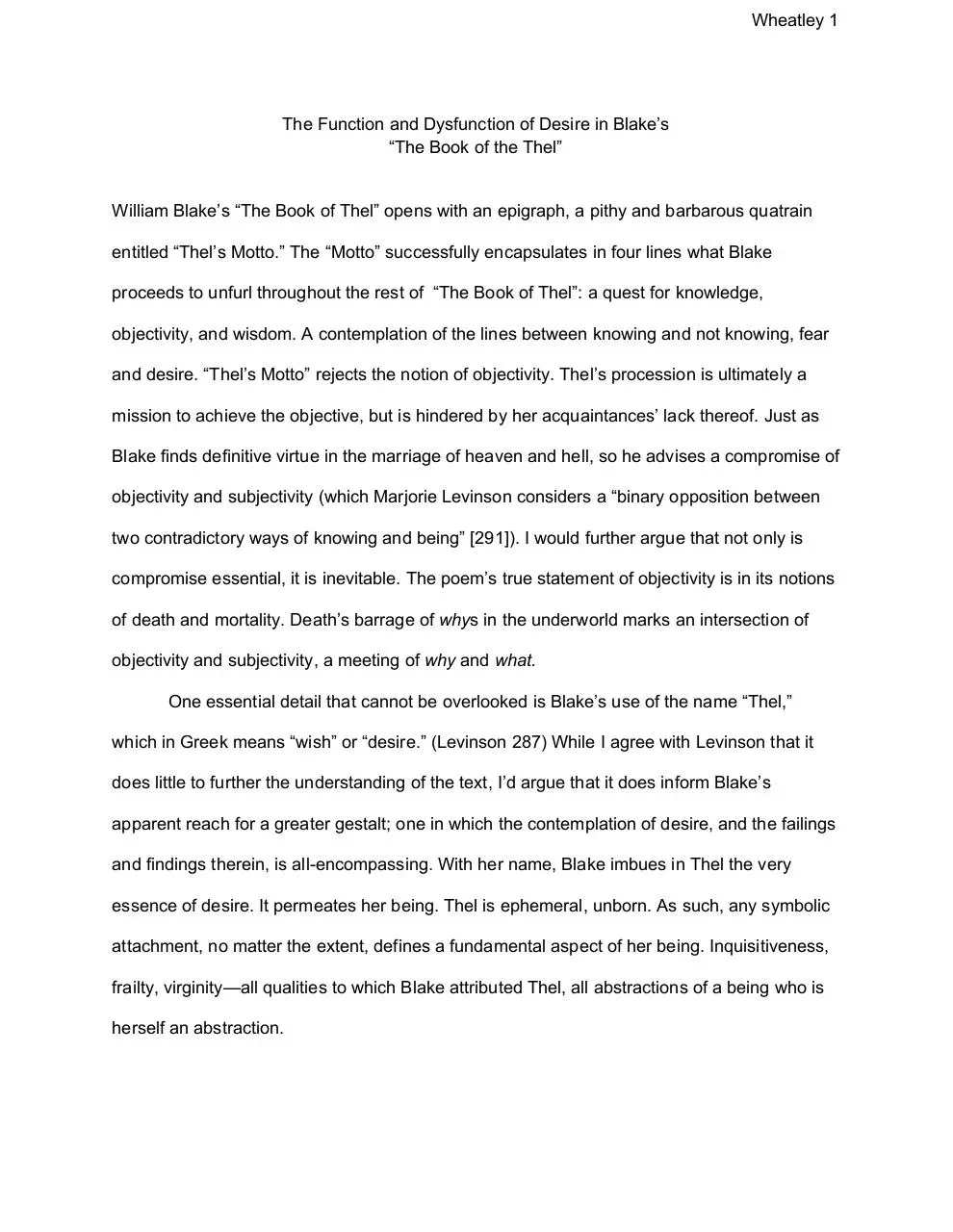
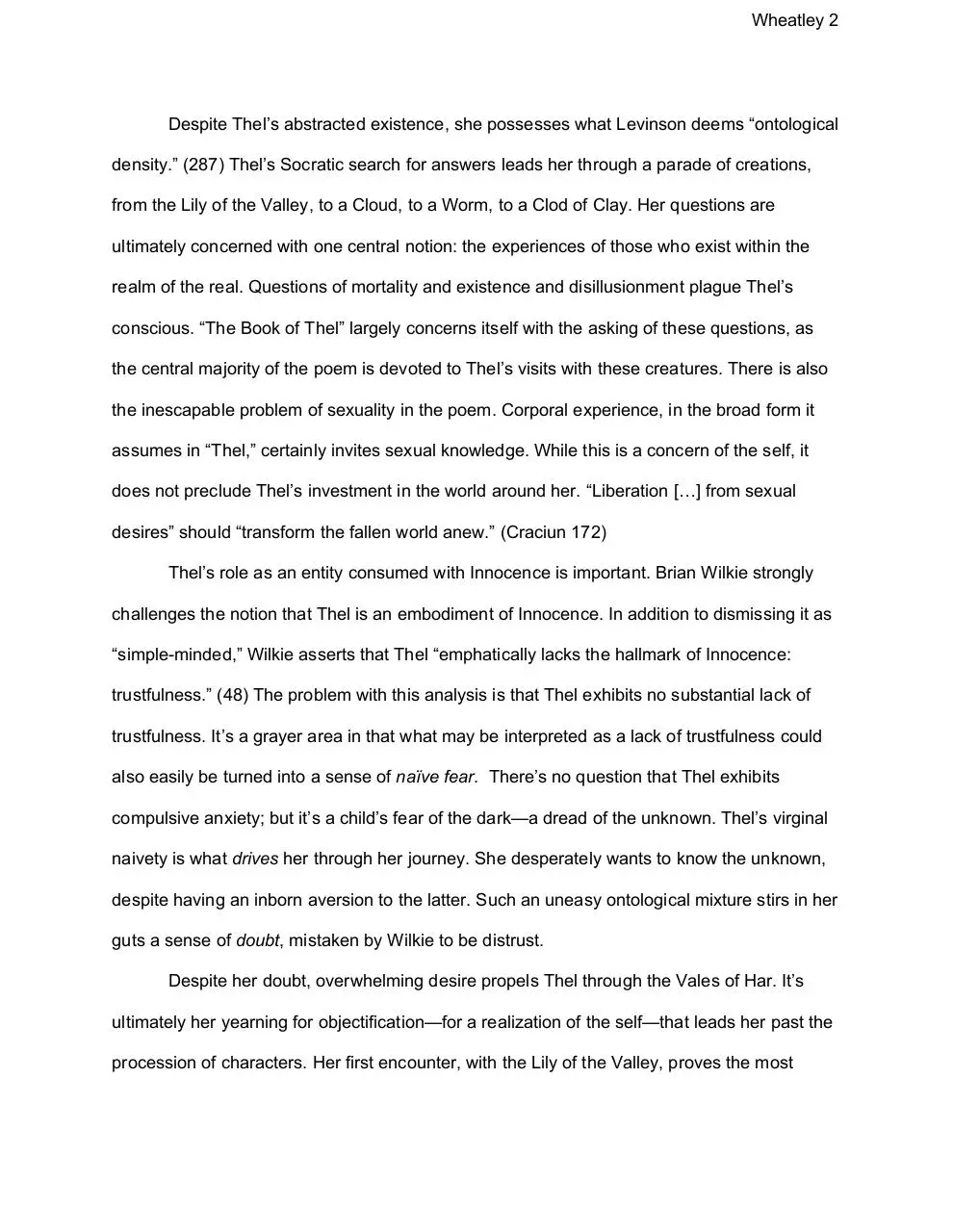
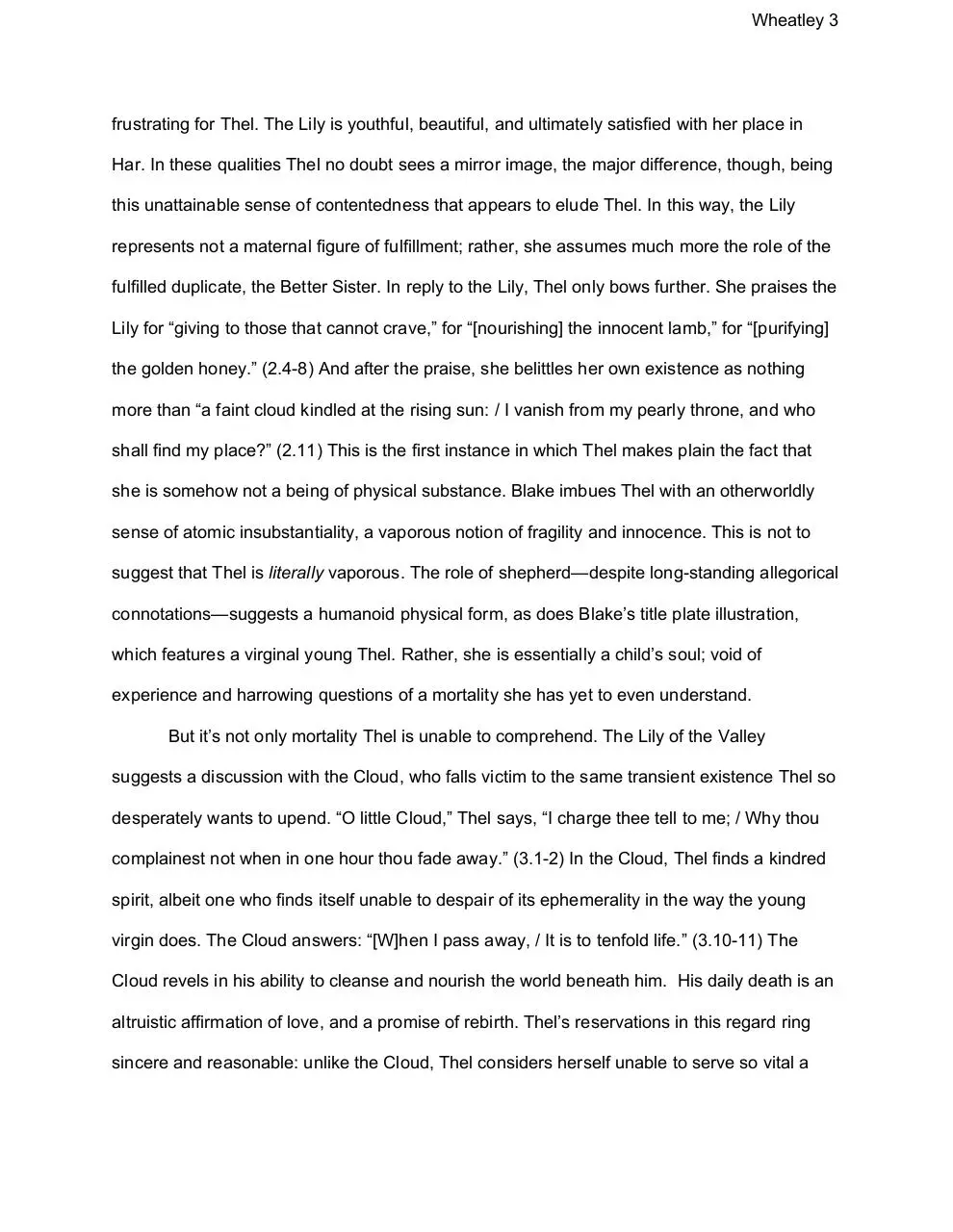
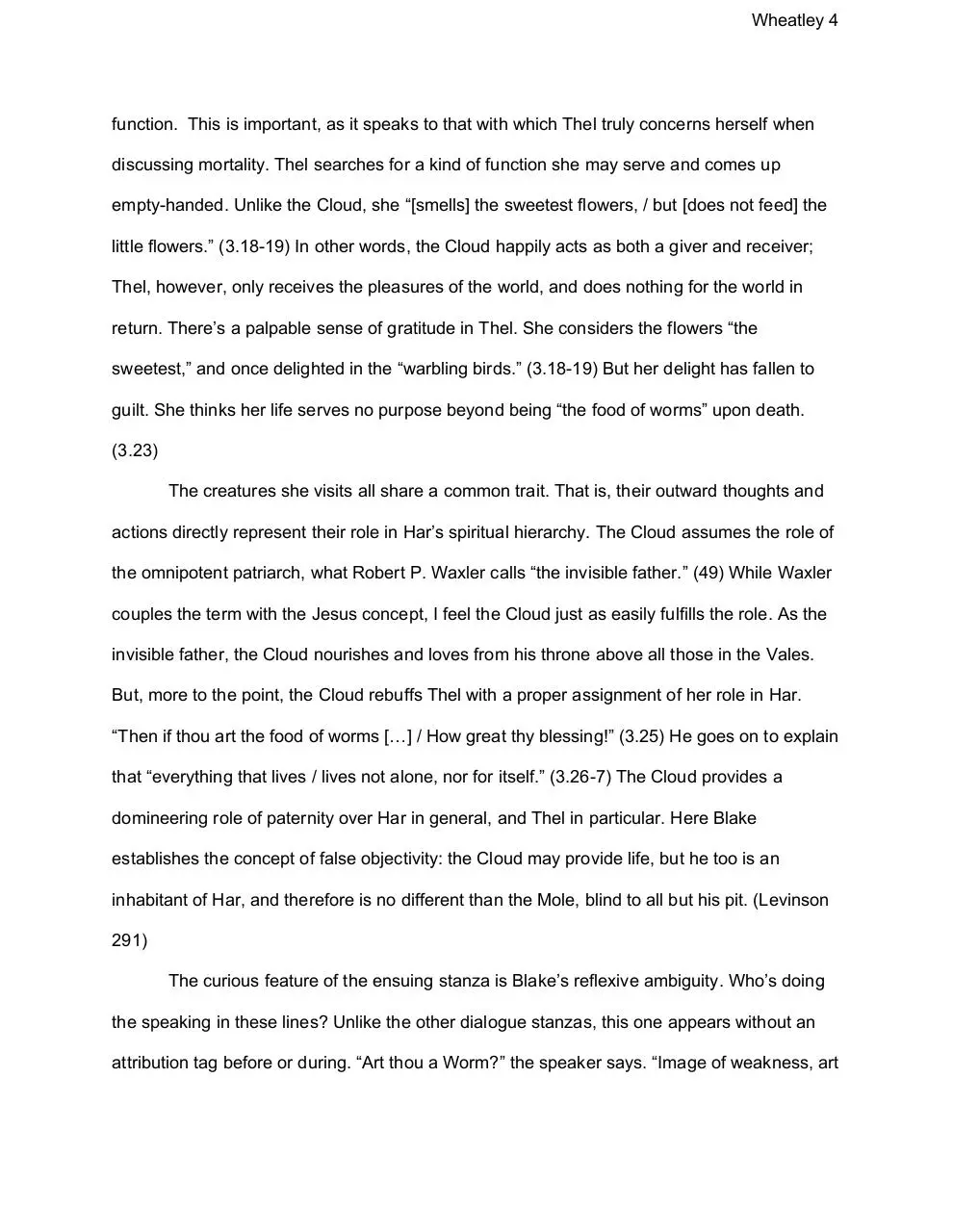

File preview
Wheatley 1
The Function and Dysfunction of Desire in Blake’s
“The Book of the Thel”
William Blake’s “The Book of Thel” opens with an epigraph, a pithy and barbarous quatrain
entitled “Thel’s Motto.” The “Motto” successfully encapsulates in four lines what Blake
proceeds to unfurl throughout the rest of “The Book of Thel”: a quest for knowledge,
objectivity, and wisdom. A contemplation of the lines between knowing and not knowing, fear
and desire. “Thel’s Motto” rejects the notion of objectivity. Thel’s procession is ultimately a
mission to achieve the objective, but is hindered by her acquaintances’ lack thereof. Just as
Blake finds definitive virtue in the marriage of heaven and hell, so he advises a compromise of
objectivity and subjectivity (which Marjorie Levinson considers a “binary opposition between
two contradictory ways of knowing and being” [291]). I would further argue that not only is
compromise essential, it is inevitable. The poem’s true statement of objectivity is in its notions
of death and mortality. Death’s barrage of whys in the underworld marks an intersection of
objectivity and subjectivity, a meeting of why and what.
One essential detail that cannot be overlooked is Blake’s use of the name “Thel,”
which in Greek means “wish” or “desire.” (Levinson 287) While I agree with Levinson that it
does little to further the understanding of the text, I’d argue that it does inform Blake’s
apparent reach for a greater gestalt; one in which the contemplation of desire, and the failings
and findings therein, is allencompassing. With her name, Blake imbues in Thel the very
essence of desire. It permeates her being. Thel is ephemeral, unborn. As such, any symbolic
attachment, no matter the extent, defines a fundamental aspect of her being. Inquisitiveness,
frailty, virginity—all qualities to which Blake attributed Thel, all abstractions of a being who is
herself an abstraction.
Wheatley 2
Despite Thel’s abstracted existence, she possesses what Levinson deems “ontological
density.” (287) Thel’s Socratic search for answers leads her through a parade of creations,
from the Lily of the Valley, to a Cloud, to a Worm, to a Clod of Clay. Her questions are
ultimately concerned with one central notion: the experiences of those who exist within the
realm of the real. Questions of mortality and existence and disillusionment plague Thel’s
conscious. “The Book of Thel” largely concerns itself with the asking of these questions, as
the central majority of the poem is devoted to Thel’s visits with these creatures. There is also
the inescapable problem of sexuality in the poem. Corporal experience, in the broad form it
assumes in “Thel,” certainly invites sexual knowledge. While this is a concern of the self, it
does not preclude Thel’s investment in the world around her. “Liberation […] from sexual
desires” should “transform the fallen world anew.” (Craciun 172)
Thel’s role as an entity consumed with Innocence is important. Brian Wilkie strongly
challenges the notion that Thel is an embodiment of Innocence. In addition to dismissing it as
“simpleminded,” Wilkie asserts that Thel “emphatically lacks the hallmark of Innocence:
trustfulness.” (48) The problem with this analysis is that Thel exhibits no substantial lack of
trustfulness. It’s a grayer area in that what may be interpreted as a lack of trustfulness could
also easily be turned into a sense of naïve fear. There’s no question that Thel exhibits
compulsive anxiety; but it’s a child’s fear of the dark—a dread of the unknown. Thel’s virginal
naivety is what drives her through her journey. She desperately wants to know the unknown,
despite having an inborn aversion to the latter. Such an uneasy ontological mixture stirs in her
guts a sense of doubt, mistaken by Wilkie to be distrust.
Despite her doubt, overwhelming desire propels Thel through the Vales of Har. It’s
ultimately her yearning for objectification—for a realization of the self—that leads her past the
procession of characters. Her first encounter, with the Lily of the Valley, proves the most
Wheatley 3
frustrating for Thel. The Lily is youthful, beautiful, and ultimately satisfied with her place in
Har. In these qualities Thel no doubt sees a mirror image, the major difference, though, being
this unattainable sense of contentedness that appears to elude Thel. In this way, the Lily
represents not a maternal figure of fulfillment; rather, she assumes much more the role of the
fulfilled duplicate, the Better Sister. In reply to the Lily, Thel only bows further. She praises the
Lily for “giving to those that cannot crave,” for “[nourishing] the innocent lamb,” for “[purifying]
the golden honey.” (2.48) And after the praise, she belittles her own existence as nothing
more than “a faint cloud kindled at the rising sun: / I vanish from my pearly throne, and who
shall find my place?” (2.11) This is the first instance in which Thel makes plain the fact that
she is somehow not a being of physical substance. Blake imbues Thel with an otherworldly
sense of atomic insubstantiality, a vaporous notion of fragility and innocence. This is not to
suggest that Thel is literally vaporous. The role of shepherd—despite longstanding allegorical
connotations—suggests a humanoid physical form, as does Blake’s title plate illustration,
which features a virginal young Thel. Rather, she is essentially a child’s soul; void of
experience and harrowing questions of a mortality she has yet to even understand.
But it’s not only mortality Thel is unable to comprehend. The Lily of the Valley
suggests a discussion with the Cloud, who falls victim to the same transient existence Thel so
desperately wants to upend. “O little Cloud,” Thel says, “I charge thee tell to me; / Why thou
complainest not when in one hour thou fade away.” (3.12) In the Cloud, Thel finds a kindred
spirit, albeit one who finds itself unable to despair of its ephemerality in the way the young
virgin does. The Cloud answers: “[W]hen I pass away, / It is to tenfold life.” (3.1011) The
Cloud revels in his ability to cleanse and nourish the world beneath him. His daily death is an
altruistic affirmation of love, and a promise of rebirth. Thel’s reservations in this regard ring
sincere and reasonable: unlike the Cloud, Thel considers herself unable to serve so vital a
Wheatley 4
function. This is important, as it speaks to that with which Thel truly concerns herself when
discussing mortality. Thel searches for a kind of function she may serve and comes up
emptyhanded. Unlike the Cloud, she “[smells] the sweetest flowers, / but [does not feed] the
little flowers.” (3.1819) In other words, the Cloud happily acts as both a giver and receiver;
Thel, however, only receives the pleasures of the world, and does nothing for the world in
return. There’s a palpable sense of gratitude in Thel. She considers the flowers “the
sweetest,” and once delighted in the “warbling birds.” (3.1819) But her delight has fallen to
guilt. She thinks her life serves no purpose beyond being “the food of worms” upon death.
(3.23)
The creatures she visits all share a common trait. That is, their outward thoughts and
actions directly represent their role in Har’s spiritual hierarchy. The Cloud assumes the role of
the omnipotent patriarch, what Robert P. Waxler calls “the invisible father.” (49) While Waxler
couples the term with the Jesus concept, I feel the Cloud just as easily fulfills the role. As the
invisible father, the Cloud nourishes and loves from his throne above all those in the Vales.
But, more to the point, the Cloud rebuffs Thel with a proper assignment of her role in Har.
“Then if thou art the food of worms […] / How great thy blessing!” (3.25) He goes on to explain
that “everything that lives / lives not alone, nor for itself.” (3.267) The Cloud provides a
domineering role of paternity over Har in general, and Thel in particular. Here Blake
establishes the concept of false objectivity: the Cloud may provide life, but he too is an
inhabitant of Har, and therefore is no different than the Mole, blind to all but his pit. (Levinson
291)
The curious feature of the ensuing stanza is Blake’s reflexive ambiguity. Who’s doing
the speaking in these lines? Unlike the other dialogue stanzas, this one appears without an
attribution tag before or during. “Art thou a Worm?” the speaker says. “Image of weakness, art
Wheatley 5
thou but a Worm?” (4.2) If these words belong to Thel, it indicates that she sees the worm as
a small, insignificant creature. Her initial disdain for her inability to do nothing but feed the
worms has proven stronger than the Cloud’s words of encouragement. She views this
creature not as an equal with which to share her spiritual wealth, but as a pitiful, “helpless”
thing. (4.5) Its nakedness—remarked upon with a subtle twinge of disgust—undoubtedly calls
to mind a phallus. Here the phallus is stripped of its usual power; the worm is impotent, and in
need of a maternal bond.
With that taken into account, the path grows curious if you consider the stanza to be
entirely spoken by the Worm. The entire dynamic of the relationship between the two is
reversed. Where the prior instance would have signified Thel as the dominant opposite of the
Worm, we’re now given a chance to see the Worm question Thel’s own spiritual integrity. “Art
thou a Worm?” Is Thel a worm? What separates the young virgin from the naked, helpless
creature sitting on the leaf? After all, isn’t it ultimately the Worm that will be devouring Thel
after she’s dead? The Cloud insists this type of relationship is something that resembles a
cooperative agreement between equals. Thel, however, stands to gain nothing in death. If this
is the Worm speaking to Thel, we’re also treated to an interesting moment when the Worm
relishes in Thel’s solitude. Thel has no one, “none to cherish thee with mother’s smiles.” (4.6)
Here we return to the filial concept previously seen in the Cloud and the Lily. Thel is an
incomplete concept, a loose abstraction of fears and worries with no discernible maternal
presence, despite (or perhaps due to) her active role as a lost daughter. As such, it’s a
grotesque mockery of motherhood when the Clod of Clay appears to soothe the weeping
phallus. (4.79)
Unlike much of Blake’s more canonical and denser texts, “The Book of Thel” follows a
fairly traditional narrative structure, complete with something resembling a climax. After
Wheatley 6
having moved from creature to creature in search of a Big Answer, Thel is invited
underground by the Clod. Blake’s close attention to language here is key. “’Tis given thee to
enter / And to return,” assures the Clod. (5.1617) Explicitly, this may be a show of goodwill or
courtesy; but the Clod’s promise of return is just as well a warning. In an appropriately epic
fashion, the “eternal gate” is lifted and Thel enters “the land unknown.” (6.12)
Thel’s descent marks the climax of the poem, but occupies little of the text itself. It’s
with this abbreviated resolution that Blake ultimately places greater importance on Thel’s
earlier conversations. Blake’s twist of the knife comes not with the revelation of this perverse
land of the living/dead; rather, we realize that Thel’s eventual descent into mortal permanence
is inevitable, and is therefore of no concern to readers. She does not desire to know what is
going to happen to her in the event of death. Thel concerns herself only with the why of the
matter. This is made most explicit in the litany of questions that explode from her grave. “Why
cannot the ear […] Why are eyelids stord […] Why a tongue impress’d?” (6.1116) It’s Thel’s
mortality personified, a vicious presence that seems to mock her ontological preoccupations.
This rip in the veil between life and death (“’A little curtain of flesh on the bed of our desire’”
[6.20]) echoes the “pervasive concern in Blake's works for the precarious nature of birth and
the thin line dividing life and death.” (Williams 486) In each of her four previous encounters,
Thel identifies a singular aspect of her being of which she lacks. Respectively: purpose,
reciprocity, childhood, and motherhood. The encounter in the underworld carries similar
prescience. Similarly, Waxler notes that because of Thel’s “lack” of “imagine” she is “unable to
risk the loss of this world […] unable to create her own life within the passionate world
available to her.” (47) The primary difference, however, is that Thel’s previous search was for
what she lacks, and therefore what she desires. What Thel does not lack, and therefore does
not desire, is knowledge of her own mortality. Thel flees the underworld because she has in
Wheatley 7
fact encountered the opposite of her desire; as Thel is Desire, what she’s encountered is her
essential opposite. Richard C. Sha notes that in later editions, “Thel’s Motto” is relocated to
the end, capping off the poem after Thel flees back into the Vales of Har. This “[gives] Thel
the last word.” (224) I would argue that also suggests that Thel has actually attained a partial
enlightenment in her descent. By ascending, Thel is taking the Eagle’s position over the
underworld, given a seemingly objective knowledge of death, sexuality, and Experience. The
inescapable truth, however, is that Thel has only retreated back into her pit of subjectivity,
once more a Mole among Moles.
WORKS CITED
Blake, William. “The Book of Thel.” The Norton Anthology of English Literature. Ed.
Stephen Greenblatt. New York: W.W. Norton & Company, 2006. 1426. Print.
Craciun, Adriana. “Romantic Poetry, Sexuality, Gender.” The Cambridge Companion to
British Romantic Poetry. Eds. James Chandler, and Maureen N. McLane.
New York: Cambridge University Press, 2008. 155177. Print.
Levinson, Marjorie. “’The Book of Thel’ by William Blake: A Critical Reading.” ELH 47.2
(1980): 287303. Print.
Sha, Richard C. Perverse Romanticism. Baltimore: The Johns Hopkins University Press,
2009. Print.
Waxler, Robert P. “The Virgin Mantle Displaced: Blake’s Early Attempt.” Modern Language
Studies, 12.1 (1982): 4553. Print.
Wheatley 8
Wilkie, Brian. “Issues.” Blake’s Thel and Oothoon. Ed. Samuel L. Macey. Victoria: ELS,
1990. 4751. Print.
Williams, Nicholas M. “Blake: Dead or Alive.” Nineteenth Century Literature. Berkeley, 63.4
(2009): 486. Print.
Download Book of Thel
Book of Thel.pdf (PDF, 152.46 KB)
Download PDF
Share this file on social networks
Link to this page
Permanent link
Use the permanent link to the download page to share your document on Facebook, Twitter, LinkedIn, or directly with a contact by e-Mail, Messenger, Whatsapp, Line..
Short link
Use the short link to share your document on Twitter or by text message (SMS)
HTML Code
Copy the following HTML code to share your document on a Website or Blog
QR Code to this page
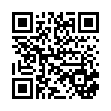
This file has been shared publicly by a user of PDF Archive.
Document ID: 0000199318.